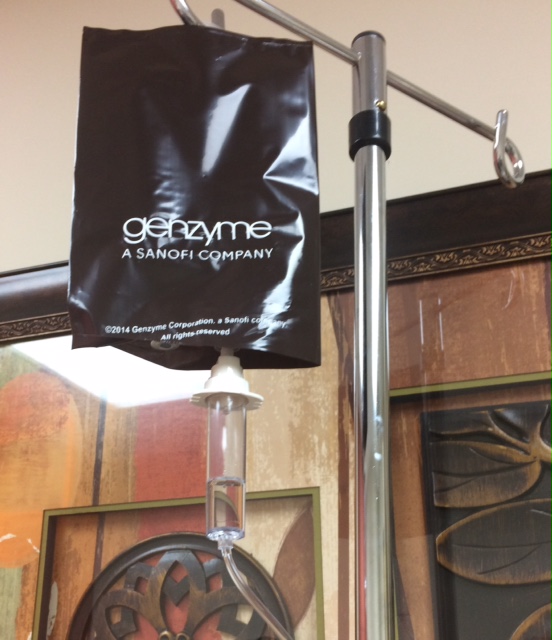My Lemtrada Journey and a 90-minute School Bus Ride
Written by |


My wife and I joined our son and his family on a tour of a Southwest Florida nature preserve today. It required riding on an old school bus-swamp buggy for a little over an hour and a half. There were plenty of gators, wild hogs, egrets, and storks in the swamp — but no restrooms. So, the bumpy buggy ride really put my bladder control to the test.
I’ve had urgency and frequency issues for years. But for the past couple of months, I’ve been getting out of bed to urinate only once on most nights — a vast improvement from the two or three times a night of sleep disturbance this urge has caused for a long time.

(Photo by Ed Tobias)
What’s changed? I’m now 10 months past the end of my second, and hopefully final, round of Lemtrada treatments. So, naturally I’ve been wondering if Lemtrada has been responsible for the improvement of this MS symptom.
Could it be because I’ve been exercising two or three times a week? I don’t think I’ve been doing that long enough for exercise to have made a real difference. I’ve been in Florida, hiding from cold and snowy Maryland for the past six weeks. That may have lessened my morning stiffness, but I can’t see any reason why it would impact my nighttime bladder. If it’s not the Lemtrada, I don’t know what it might be.
What’s next?
All in all, I think the Lemtrada treatments, which began in December 2017, have done what I’d hoped they would do and more. My 25-foot walking test has improved a little. The same goes for the nine-peg test that’s used to test finger dexterity. The feeling in my feet has improved. My MRIs show no progression (though that was the case for a number of years before Lemtrada). And of course, making it through the night with nature calling far fewer times is a real blessing.
Now, what’s next? The standard Lemtrada protocol calls for two series of infusions a year apart. Though some people have required a third round of infusions, most have not. I’m 70 and have used disease-modifying therapies to treat my MS for nearly 25 years. Lemtrada was the right choice for me. I’m glad that I was treated with it. But at this point in my life, even if my MS were to progress, I think that I’m done with any more DMTs. As I wrote after I completed round 2, my drip stops here.
You’re invited to visit my personal blog at www.themswire.com.
***
Note: Multiple Sclerosis News Today is strictly a news and information website about the disease. It does not provide medical advice, diagnosis, or treatment. This content is not intended to be a substitute for professional medical advice, diagnosis, or treatment. Always seek the advice of your physician or other qualified health provider with any questions you may have regarding a medical condition. Never disregard professional medical advice or delay in seeking it because of something you have read on this website. The opinions expressed in this column are not those of Multiple Sclerosis News Today or its parent company, Bionews Services, and are intended to spark discussion about issues pertaining to multiple sclerosis.



Julie carbine
I had my second round of lemtrada. It's the best med for MS ever.
Ed Tobias
Good luck, Julie! I hope you keep doing well on it.
Ed
Kathleen Fulghum
Thank you for your wonderful columns, Ed. They are so helpful. I just turned 74, have SPMS, and elected a couple of years ago that I was done with DMTs.
Had two free years of Acorda's Ampyra, and was out of wheelchair more often, and swimming longer. Costs of the Mylan, and now Ascend dalfampridine 10 mg ER are breathtaking, but United Health AARP Plan D is helping.
On the urinary topic, I was prescribed alfuzocin HCl ER 10 mg by a urology nurse practitioner, and it really helps cut down on bladder awakenings during the night. Continued gratitude and good wishes to you.
Ed Tobias
Thanks, so much, for your kind words Kathleen.
There's no simple solution to traveling our MS road but I've managed to find a few things to help. I'm glad that you have as well.
By the way...I slept through the night last night, a full eight hours! Keep your fingers crossed that I get a few more of those.
Ed
Amy L Higgins
Thank you so much for writing your article. I found it interesting and finished my second round of Lemtrada in August, 2018.
I have issues with my bladder still but some nights I can sleep all the way through and other nights I cannot.
Ed Tobias
Hi Amy,
Thanks for taking the time to comment.
Lemtrada is certainly an interesting ride, but it seems to be worth the "ticket price." Here's an update to what you read: I slept through the night last night...a full eight hours!
I wish you the best with your Lemtrada journey.
Ed
Cyndi
Ed,
I am truly happy for you and the life improvements. You may have previously written on this subject so I will apologize in advance if duplicative. Two questions: What negatives did you experience in the Lemtrada treatments? With the benefits you have seen, why won't you pursue another Lemtrada treatment? Regardless, my best to you for continued positive progress.
Ed Tobias
Cyndi,
I've written columns about my Lemtrada experiences. You can find them if you search for "Tobias Lemtrada" on this website.
In brief: The first round was a roller coaster of energy levels. I also came down with a brief strep infection which was easily handled with an antibiotic. The benefits are my symptoms have not become worse. I've seen a slight improvement in walking speed, energy, hand dexterity, and memory (i.e. losing track of what I wanted to do). I've seen a definite reduction in bladder urgency and frequency. I don't expect to have a third Lemtrada because the treatment is usually only two rounds and I don't think a third round would give me much, if any, additional benefit.
Ed
Fellow Marylander
Ed, I always find your columns informative. I try to be informed for my daughter, diagnosed 3 years ago at age 16. She is on Tecfidera and I wonder what's next and when. After Lemtrada is there nothing else to offer? She's so young, I don't want to "use up" her choices but don't want her issues to progress. I know asking her doctor is advised but also appreciate your perspective on things.
Ed Tobias
Wow. That's one of the toughest questions I've ever been asked. You may know, from reading my stuff, that I usually favor hitting MS hard and fast. But, for a sixteen year old I think you really need to consider her lifestyle needs.
Taking a pill, once a day, is a whole lot different than being treated with an IV infusion. In the case of Lemtrada the treatment requires being hooked up to an IV for six to eight hours a day for five days in a row. That's repeated a year later, but only for three days. The treatment also involves steroids, which some people find difficult to handle, and it can leave you on a roller coaster of energy levels.
So, I'd suggest two things. First, tell the doctor the concerns that you just told. Ask why Tecfidera was the drug he or she chose...and were any other treatments considered. Second, ask your daughter if she has a preference.
I think that's what I'd do if I had a sixteen year old with MS.
Oh, I wrote something a couple of years ago about pediatric MS and it includes the names of a few pediatric MS groups. It's important that your daughter knows she's not the only teenager with this disease. Getting in contact with other teens, and their parents, may be helpful to you both.
Ed